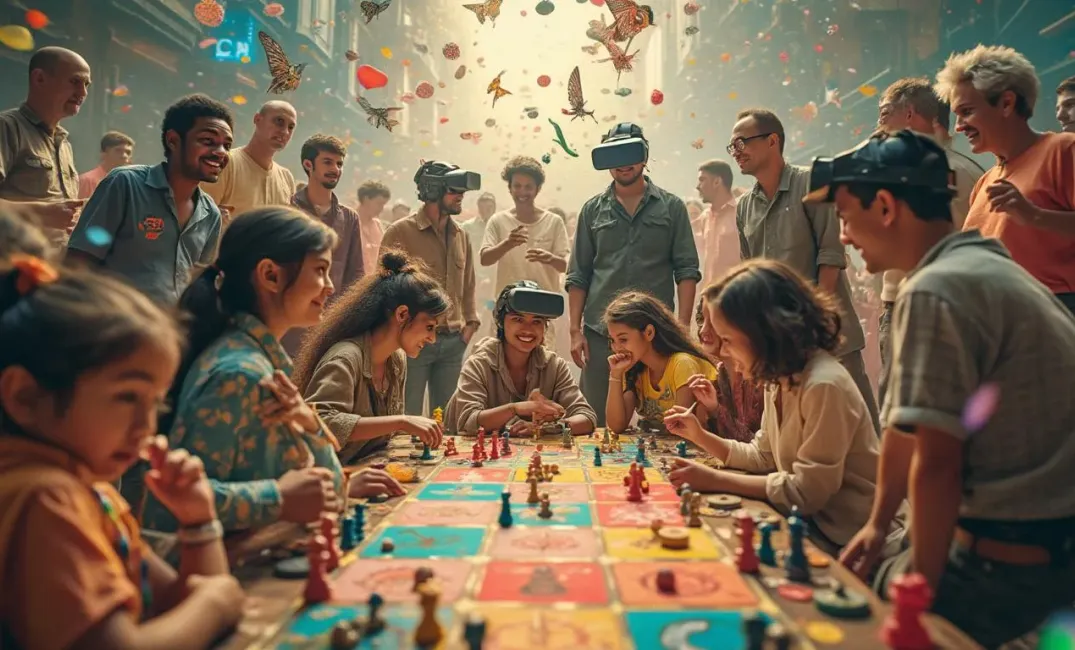Introduction: The Playful Pulse of Humanity
"Play is the highest form of research." — Albert Einstein
From the ancient past to the distant horizons, play has been a vital component of human existence. More than mere amusement, it acts as a developmental foundation, a form of expression, and a cultural bridge. Games and play have shaped societies, informed technological advances, and reflected the essence of what it means to be human. This exploration delves into the symphony of human play, tracing its evolution, cultural significance, and enduring legacy as a testament to imagination and creativity.
The Historical Landscape of Human Play
Ancient Play: Roots and Rituals
- Primitive Beginnings: Archaeological findings reveal that early humans engaged in playful activities, evidenced by bone dice and simple toys, illustrating play's intrinsic quality even in primitive societies.
- Cultural Significance: Games like the Royal Game of Ur, dating back to 2600 BCE in Mesopotamia, held spiritual and ritualistic significance, intertwining with ancient cosmologies and societal norms.
Classical Games: Strategy and Skill
- Chess and Its Precursors: Games of strategy, such as chess, originating from chaturanga in ancient India, reflect societal structures and intellectual prowess, becoming staples of royal courts and intellectual pursuits.
- Athletics and the Olympics: The ancient Greeks institutionalized play through the Olympic Games, celebrating athleticism and communal identity, offering a stage for political and cultural expression.
The Cultural Tapestry of Play
Play as Social Elixir
- Interactive Play: Board and card games have functioned as social catalysts, bridging communities and generations, exemplified by global classics like backgammon and mahjong.
- Festivals and Carnivals: Throughout history, festivals integrated play into community life, featuring competitive and cooperative games that built social bonds and cultural cohesion.
Educational Dimensions
- Learning through Play: Play is a pivotal educational tool, fostering cognitive and emotional development in children through interaction, creativity, and problem-solving.
- Simulations and Role-Playing: Historically, role-playing and simulations have enabled societies to train for future scenarios, from war games to business strategy models.
The Evolution of Modern Play
Technological Transformations
- Digital Revolution: The advent of video games has revolutionized play, transforming it into a multifaceted industry that infuses technology with storytelling, from early text adventures to immersive virtual realities.
- Gamification in Society: The principles of play now extend into education, health, and business, using gamification to enhance engagement, motivation, and efficiency.
Diverse Platforms and Narratives
- Tabletop Renaissance: Despite technological advances, tabletop games have experienced a resurgence, driven by the desire for tangible interaction and storytelling through games like Dungeons & Dragons.
- E-Sports and Global Reach: E-sports exemplify competitive play's modern incarnation, drawing massive global audiences and professional leagues, reflecting technological convergence and cultural exchange.
The Role of Play in Modern Society
Therapeutic and Psychological Impact
- Laughter and Play Therapy: Employed in therapeutic settings, play encourages emotional healing, creativity, and stress reduction, illustrating its therapeutic potency beyond conventional playtime.
- Community Building and Resilience: Shared play experiences strengthen community ties and resilience amid adversities, fostering collaboration and social empathy.
Ethical and Sociocultural Challenges
- Digital Disparities: The increase in digital play highlights issues of accessibility and digital divide, raising questions about equity and inclusion across socioeconomic backgrounds.
- Cultural Sensitivity: As play crosses cultural boundaries, ensuring respect for diverse narratives and practices remains essential to foster inclusive environments.
Future Horizons: Play in a Galactic Context
Play Beyond Earth
- Interstellar Recreation: As humanity aspires to colonize other planets, envisioning forms of play suitable for microgravity and extraterrestrial settings offers opportunities to unify astronauts and settlers.
- Cultural Continuity: Games will play crucial roles in maintaining cultural heritage and morale during long space journeys and between diverse planetary communities, preserving human connections.
Sustainable Play Practices
- Eco-Friendly Gaming: The gaming industry's environmental impact prompts shifts towards sustainable practices in production and energy consumption, aligning play with broader ecological responsibilities.
- Inclusive Design and Innovation: Continued innovation in game design must prioritize inclusivity, ensuring new games address diverse needs, stories, and accessibility for all players.
Conclusion: The Eternal Dance of Play
"You can discover more about a person in an hour of play than in a year of conversation." — Plato
Play is not merely a diversion; it is a profound expression of the human spirit, a bridge to knowledge, creativity, and connection. Through its playful dance across history, cultures, and technologies, play reveals the ever-adaptive nature of humanity, reflecting resilience and imagination in the face of changing landscapes.
As societies progress, the legacy of play remains a testament to human ingenuity and the ubiquitous desire for exploration, joy, and understanding. Recognizing play's cultural value, psychological benefits, and future potentials ensures its role as a cherished aspect of human life across galaxies, inspiring generations to explore the boundless possibilities of interconnected existence. Onward, we journey, with play as both our compass and companion, guiding us toward a future defined by imagination, unity, and the joy of discovery.
CULTURE, GAMES, TECHNOLOGY, PLAY, INNOVATION, SOCIETY, HISTORY, EVOLUTION, IMAGINATION, EDUCATION

